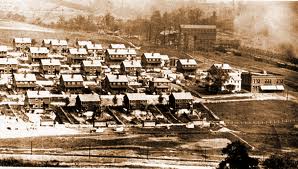
Photo courtesy of the collections of the “Coal & Coke Heritage Center,” Penn State University Fayette Campus, Uniontown, PA
By Ravi Logan
A “company town” is a town in which all property, services, and enterprises are owned by a single company. In a company town, it is the company that hires, fires, and retires workers. It is the company that runs the store where people get their commodities and that controls the water and the electric systems. The company runs the school and runs the medical clinic. The company owns the homes that workers rent. And it is the company that brings in the hired security force when there is labor unrest. In the company town, whose interests rule?
“The world is becoming a company town.”
Let us now consider the global economy. In the global economy, who provides the jobs; who outsources the jobs? Who runs (and ruins) retirement programs? In the global economy, who owns the resources, and who plunders the resources? Who decides what factories get built — and then decides when they get moved and where? Who runs the hospitals; who controls the energy grid, the media, the currency? It is an increasingly small number of growing conglomerates.
The world is becoming a company town writ large. Transnational corporations thrust into every sphere of life — including those once within the purview of civil society or of government. They are contracting to run prisons. They are taking over municipal water supplies. They are privatizing education. They run the cable systems. They underwrite public broadcasting. They manage military logistics.
And they are thrusting just as forcefully into political life. Agents of big corporations draft legislation. Government officials come from the ranks of corporate executives, or from corporate lobbies or councils. The selection and funding of candidates for elected office is determined by corporate money. And electronic voting machines are manufactured, programmed, operated — and sometimes rigged — by big corporations.
The world is becoming a company town. The power once vested in the people, or in local communities, to decide their destinies, to shape their collective life, is being usurped by the planet-spanning metacorporations.
In a company town, when the coal plays out, when the timber is all cut, what happens to the company? What happens to the town? And what happens to the mill tailings, to the ruined forests? In a company town, what responsibility does the company take for the future well-being of the people, of the land?
In the same way, the global economy, what responsibility do the global corporations take for the well being of communities, cultures, and families? Or of species, of ecosystems? What care do they take to maintain the purity of the water and the air? Except under pressure of regulations or public protest, what willingly do they do in the service of life? Damn little. Their allegiance is to their profits.
Why, then, should humanity cast its future with the global company town?
From Company Town to Global Village
I am not a political activist or political philosopher; I’m a spiritual teacher. Spirituality is that which uplifts the human spirit; it is that which gives us vibrant connection to all life, to all being. Spirituality speaks to the deep desires of human beings to feel joy, to feel connected in love.
I cannot help but be aware that in the global economy spiritual life is impoverished. And without spiritual life, the essence of our humanity goes unexpressed. This is too steep a price to pay for a paycheck.
But without a paycheck to get our basic amenities, it’s tough to pursue spiritual life. Without a vital economy, spiritual life cannot flourish.
Many people now rise in struggle to curtail the excesses of the globe spanning corporations. Their struggles perhaps serve to lessen the oppressiveness of life in the global company town. But this is not sufficient for spiritual life to flourish.
What more is needed is for humanity to embrace a new paradigm of development, a life economy that returns economic power to people and communities, that promotes equity, and that seeks a sustainable balance with the biosphere.
This is the project of the Progressive Utilization Theory, of PROUT.
Ravi Logan is the Director of the PROUT Institute (www.proutinstitute.org) and author of PROUT: A Solution-Oriented Paradigm of Development.
